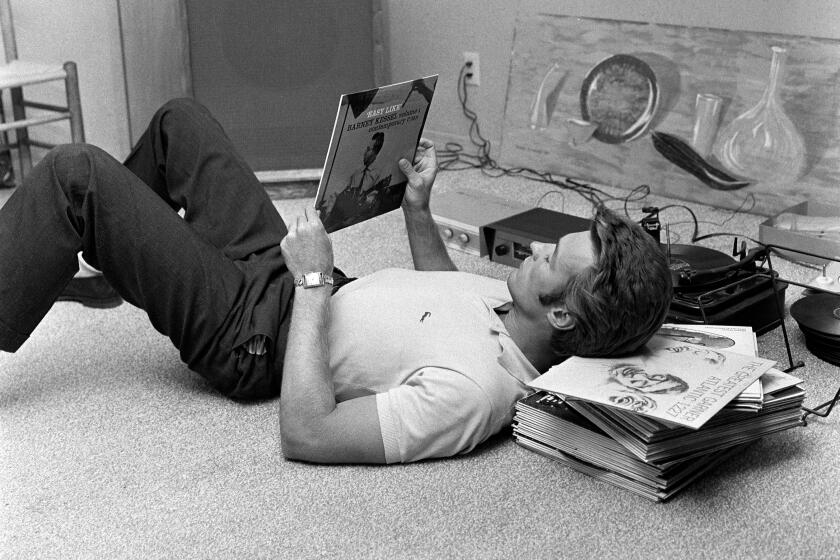Hymns of the apocalypse: Pearl Jam’s new album was made for this pandemic moment
- Share via
It’s like they knew.
Of course Pearl Jam didn’t intend for its new album, “Gigaton,” to be a coronavirus hymnal. After all, it has been gestating for seven years, taking shape via a sort of long-distance, idea-sharing dynamic necessitated by the band members being adults with lives and children who they had been ferrying to school and soccer and the stuff of everyday life as we knew it. Such were the ways of the old world.
Now the pandemic has rendered much of pop culture, save for a few classic westerns and the miraculous Larry David, as anachronistic as a Grand Princess cruise line commercial. Maybe these would be the days the music died too?
But on a walk around my neighborhood not long ago — that is, not long ago according to the calendar — I started my afternoon ritual of bearing mute witness to the gathering gloom by scrolling through my phone, looking for musical companionship. Ambulatory existential reckonings had become an increasingly tall order, and my wide-ranging library was struggling to rise to the occasion even as the loss of a few friends and the infection of others had me thinking about old friends and what they’ve meant to me.
Then Spotify, ever the optimist, teased me with the news that an old musical friend, Pearl Jam, had a new record out. When I returned home some 57 minutes later — possibly to never leave again — all I could say to my wife was, “It’s like they knew.”
How to keep Coronavirus stress at bay: Listen, really listen, to your favorite albums, front to back, without distraction.
A more innocent variety of social distancing with the band members leading separate lives may have contributed to how fresh this album feels. You can feel their individual compositional contributions on every track. But for the most part, no one footprint feels like it’s too large. “Gigaton” sounds as democratically unfettered as anything we’ve heard from Pearl Jam since “No Code” cast the band’s fair-weather fans into the wilderness of Creed.
The first single, “Dance of the Clairvoyants” is a good example. Instead of one of Pearl Jam’s trademark, throat-grabbing riffs, or the familiar, warm warbles of Eddie Vedder’s baritone, the song greets listeners with a 1980s-era synth beat over which guitarist Stone Gossard, who is responsible for a lion’s share of those aforementioned riffs, plays a throbbing, dance-floor bass while drummer Matt Cameron surrenders his sticks for a programmed, metronomic beat.
You might think you’d landed on a new jam from the Weeknd until bassist Jeff Ament disrupts the groove with choppy, post-punk guitar fills and Vedder digs into a David-Byrne-on-ecstasy sermon. The song is filled with messages that seem like they were written from the future were are now living in: No one man can be greater than the sun / That’s not a negative thought / I’m positive, positive, positive.… When every tomorrow / Is the same as before / Numbers keep falling off the calendar’s floor / We’re stuck in our boxes / Windows open no more.
And while the song’s particulars seems ready-made for these times in a way that’s both eerie and comforting, the swelling, gospel-like refrain at the finish becomes a disarmingly raw invocation of male compassion: “Stand back when the spirit comes.”
Julian Casablancas on the Strokes’ prophetically titled new album, ‘The New Abnormal,’ and the moment he knew that Bernie Sanders was doomed.
The thick, dance-groove bottom, off-kilter arrangement and spacey atmospherics continue on “Quick Escape,” about lighting out from this dead planet to another even redder one. Squalling bursts of guitar noise countered by a delicate, descending keyboard melody and the crashing of Cameron’s cymbals build to an almost impossible groove. A delicious bit of feedback substitutes for a horn section near the climax. When lead guitarist Mike McCready is finally let off his leash, he cracks open the sky like it’s 1991.
“Alright” follows with a more delicate, electronica-flecked intro before a reverb-saturated guitar interrupts the trance and Vedder sings lines tailored for social distancing: “It’s alright to shut it down / disappear into thin air / it’s your home / it’s alright to be alone / to listen for a heartbeat / it’s your own.”
A few tracks later, “Buckle Up,” a lilting lullaby with the most heart-wrenching kazoo break in recent memory, speaks of bedsores and sponge baths before solemnly intoning us to, “Firstly do no harm / and then put your seat belt on.”
The cumulative effect is both devastating and transcendent, like a funeral and a wake.
Pearl Jam has always worn its heart on its sleeve, and with cover art showing the band’s name flat-lining across a melting ice shelf, it’s pretty clear what the band’s thematic intentions were. But context is everything and it’s a testament to a fully engaged Vedder that his end-of-the-world epitaph is both broad enough and personal enough to land so gracefully in the middle of a moment so pregnant that any art made in reaction to it is in danger of becoming instantly obsolete.
Then again, maybe I shouldn’t be surprised. It’s easy to forget over all these years and revisionist histories and with how tragically unhip they’ve become, that Pearl Jam has turned this clairvoyant trick before. It’s easy to forget how songs such as “Once,” “Why Go?,” “Even Flow,” “Jeremy” and “Alive” articulated a generation’s inchoate struggles with bullying, abuse and gender inequities long before Columbine, #MeToo and the ongoing suicide epidemic had stamped them into the national consciousness.
Lost in its visceral thrills, youthful sturm and drang, and arguments over whether or not it was “alternative” enough is just how presciently moored to a moral compass “Ten” was.
And despite the praise critics (save those privileged hipsters at Pitchfork) are heaping on “Gigaton’s” musical adventurousness, it’s really the band’s moral compass and enduring empathy, seasoned and mellowed for three decades, that makes this record such a welcome companion.
Make no mistake, this is the work of angry men — there’s thunder on the horizon, rivers are swelling and lights are going out — but they aren’t young any more. They are fathers and they do more singing than shouting.
As a result, the visions of loss on “Gigaton,” whether inspired by shedding ice shelves or novel coronaviruses, never feel like abstractions and stay human in scale. And even with the mounting anxieties and very real sorrows coming to our doorsteps, Vedder’s warm voice and assured melodies slowly take command, providing glimmers of hope, resilience and even ecstasy.
The album fades out, fittingly, with a pump-organ dirge and the singer cooing a message from the other side that reminds us to, “Share the light.”
Pearl Jam knows we’re not feeling fine here at the end of the world, but they’re hoping this helps.
More to Read
The biggest entertainment stories
Get our big stories about Hollywood, film, television, music, arts, culture and more right in your inbox as soon as they publish.
You may occasionally receive promotional content from the Los Angeles Times.












